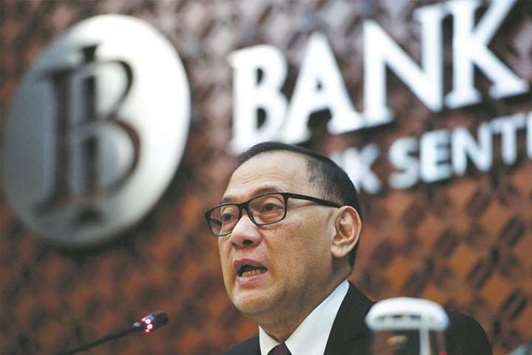Indonesia’s central bank yesterday hiked its benchmark interest rate for the first time since 2014, bowing to growing pressure to bolster the fragile rupiah and stem an outflow of capital.
The decision comes at a time policymakers in emerging markets around the world are being forced to bite the bullet on rate rises.
Their economies are being buffeted by a spike in bond yields and falling share-prices as oil prices increase and US interest rates could keep climbing.
At an April meeting, Bank Indonesia (BI) said it would be “overkill or counterproductive” to raise interest rates.
But yesterday, it raised the 7-day reverse repurchase rate by 25 basis points to 4.50%.
In 2016 and 2017 combined, BI cut the key by 200 bps to try to spur lending and economic growth.
With the rupiah under further pressure, the rate increase “was a case of the central bank bowing to the inevitable,” Gareth Leather, senior economist at Capital Economics, said in a note.
Bank Central Asia’s chief economist David Sumual said he is expecting another 25 bps hike if capital outflows persist.
And ANZ, which previously expected no rate change in Indonesia, now said it expects two more 25 bps hikes later this year, which are “likely to adversely impact growth prospects”.
Southeast Asia’s largest economy is one of the region’s worst affected by the combination of rising US yields and higher oil prices, and has seen about $4bn leave its markets over the past month as foreign investors review their exposure to higher-yielding emerging markets.
BI governor Agus Martowardojo, who later this month will be succeeded by Perry Warjiyo, a current deputy, said Thursday’s increase was in response to rising global financial uncertainty amid tighter US dollar liquidity.
While Indonesia has projected the Federal Reserve will hike rates three times in 2018, the governor said there is a risk it could make four increases.
“If conditions force us to adjust the policy rate again, we will not hesitate to do that,” Martowardojo said.
Fitch Ratings yesterday warned that if central banks in emerging markets had been running too loose monetary policy to cater to domestic economic conditions, “there may be significant adjustments ahead as global conditions change”.
The rupiah has fallen more than 5% to past 14,000 per dollar in four months as Indonesian 10-year bond yields jumped more than a percentage point, and the Jakarta stock market is down 8% this year. BI deputy governor Dody Budi Waluyo said 2018 economic growth is seen weakening slightly due to yesterday’s rate hike, but would stay within the 5.1-5.5% outlook. First-quarter growth was already slightly below market expectations, at 5.06%, as private consumption remained sluggish.
He also said inflation rate is expected to stay within the central bank’s 2.5-4.5% target range despite the rupiah’s slump.
The annual inflation rate was 3.41% in April.
BI has tried to put a floor under the rupiah by intervening in both the currency and bond markets, but its foreign exchange reserves declined by $7.1bn in February through April.
Financial stability is a big priority for an economy running a current account deficit and has a long history of volatile capital flows.
Foreigners hold more than one-third of outstanding Indonesian government bonds.
“It is not ideal for the central bank to raise rates to prevent the currency worsening, but seems like they have no choice,” said Ivan Chamdani, a fund manager at Maybank Asset Management in Jakarta. “It would be funny if they keep intervening in currency but they leave their stance loose, not hiking rates.”
Bank of America Merrill Lynch analysts Rohit Garg and Mohamed Faiz Nagutha said that even in an extreme scenario of capital outflows being as much as 20% of foreign exchange reserves, Indonesia would be better off than in 2013 and have enough reserves to fund 5-1/2 months of imports.
At the end of April, reserves were $124.9bn.
If reserves drop beyond $110bn, pressure on BI to hike “will increase significantly,” they said in a note earlier this month.
In a Reuters poll, 13 of 21 economists had predicted a rate hike at yesterday’s meeting.

Bank Indonesia governor Agus Martowardojo speaks during a briefing at the bank’s headquarters in Jakarta. Indonesia’s central bank yesterday hiked its benchmark interest rate for the first time since 2014.
